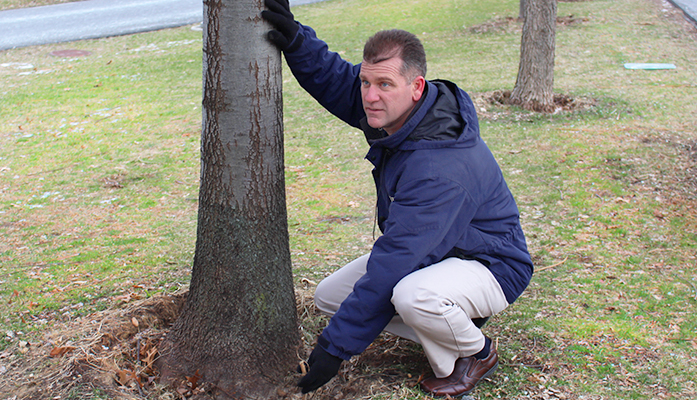
A Penn park supervisor applies environmental science to University City parks
“I’m learning the science behind ecology,” explains Sam Royer (Master of Environmental Studies ’19). With an undergraduate degree in landscape architecture and years of experience designing and managing green spaces, Sam is the park supervisor responsible for maintaining the University of Pennsylvania’s Shoemaker Green and Penn Park. But as he completes technical courses in aqueous geochemistry and field biogeochemistry in Penn’s Master of Environmental Studies degree, he looks at the landscape in a new light. “The biggest thing I've learned is that I’ve got a lot more to learn,” he laughs. “It’s eye-opening, and it makes me better at my job.”
For his capstone research project, Sam is evaluating the ecological health and sustainability of Penn Park. When the riverside athletic park was built in 2011, its acres of athletic fields were bordered by grass meadow plantings. In the next few years, an orchard of fruit-bearing trees and shrubs was planted with the help of the Philadelphia Orchard Project. But it takes time for a designed landscape to take root and flourish, and an active urban park fields a lot of human traffic. Sam is measuring the level of invasive weeds, taking inventory of the changing treescape and examining the effectiveness of the underground water management system. The data reveals a detailed portrait of the 24-acre park after seven years, which—in combination with the cutting-edge sustainability research at Penn—may refine current management policy and practice. “I’m on both sides of the fence,” says Sam of his dual role as student and park supervisor. “I hope to make that connection between facilities and academia stronger.”
In the meantime, Sam incorporates lessons from his resource management curriculum into his day-to-day tasks, from enriching the campus-processed compost with branches taken from campus trees to planting a native grass meadow underneath the rail bridge. Like Penn Park, the meadow will need several years and a few check-ups to thrive; Sam is working with Penn’s Student Eco-Reps program to evaluate the sprouting meadow flowers and soil pH. “I'm using native plants that are drought tolerant and won't need to be fertilized, so once they get established they can take care of themselves,” he explains. “It’s all under the umbrella of sustainability, with the goal of requiring less energy.”





